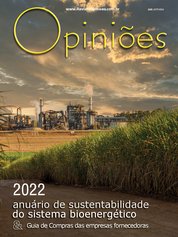Bernardo Grandin
CEO da Granbio Bioenergia
AsAA22
O Brasil pode liderar a agenda mundial de sustentabilidade quando quiser
O Brasil desenvolveu sua economia lastreada em uma das matrizes energéticas mais limpas do mundo por aptidão geográfica e uma estratégia de reduzir a dependência do petróleo. Ao aliar sua vocação agrícola com o potencial energético renovável, promoveu um crescimento econômico sustentável, de forma pioneira no mundo por décadas, e o setor sucroenergético é parte importante desse sucesso.
O Proálcool foi um projeto de País orientado por missão: independência do petróleo e criação de uma cadeia produtiva nacional robusta e sustentável. Deu certo.
Segunda a Unica – União da Indústria de Cana-de-Açúcar e Bioenergia, o setor sucroenergético emprega mais de 2 milhões de pessoas, direta e indiretamente, provê mais de 8% da energia elétrica do País a partir de biomassa e evita 515 milhões de toneladas de CO2 por ano ao substituir parte do uso da gasolina.
O etanol celulósico ou de segunda geração (2G) tem o potencial de determinar uma nova onda de inovação tecnológica, ampliando o potencial brasileiro na agenda de descarbonização do setor de transportes, fora do debate comida x combustíveis. A tecnologia atual permite aumentar em mais de 50% a produção de etanol no Brasil utilizando resíduo agrícola – a palha da cana. O etanol celulósico tem uma pegada de carbono ainda menor que a do etanol convencional.
Além da possibilidade de aumentar a eficiência de áreas já plantadas de cana-de-acucar, o etanol 2G, aliado a plantas como a cana-energia, oferece um potencial transformador em nível global. Segundo a Embrapa, o Brasil tem cerca de 200 milhões de hectares de área de pastagem nativa ou implantada; desses hectares, 130 milhões configuram área degradada. A combinação de etanol 1G e 2G a partir de cana-energia tem o potencial de produzir 24 mil litros por hectare. Isso equivale dizer que o Brasil teria como substituir toda a gasolina consumida no mundo por etanol utilizando menos da metade da sua área de pasto ou degradada e reduzir em 7% o total de emissão de gases de efeito estufa do mundo.
O futuro da mobilidade caminha para a eletrificação dos motores, que são mais eficientes do que o de combustão e não emitem gases de efeito estufa. Os países desenvolvidos articulam o debate público e promovem políticas e novas legislações em interesse próprio, o que é natural. Portanto, na Europa, por exemplo, vale o conceito “tanque à roda”; o veículo que não produz CO2 é verde, não importa se usa uma bateria de lítio-cobalto de 1 tonelada alimentada por eletricidade de carvão mineral.
O Brasil tem a oportunidade de investir na bioeletrificação – usando o etanol com células de combustível para alimentar motores de veículos elétricos, no conceito completo da cadeia do carbono limpo. Uma nova política pública orientada por missão, como foi o Proálcool, para bioeletrificação ou para expansão do etanol 2G, poderá replicar o sucesso com um impacto ESG sem precedentes em nível global.
O setor sucroenergético evoluiu tecnológica e ambientalmente. A mecanização da colheita aliada à consciência de preservação dos biomas permitiram o aparecimento de onças pardas em São Paulo. Como a onça parda está no topo da cadeia alimentar, um ecossistema inteiro vem sendo recuperado por práticas de sustentabilidade.
Sustentabilidade faz parte do core business do setor sucroenergético. Nenhuma narrativa supera a prática de um negócio na sua essência, que tem sustentabilidade não apenas como compromisso de fim, mas como seu meio de fazer e existir.
O setor sucroenergético brasileiro pode ser uma das respostas sustentáveis mais contundentes para reverter o impacto da mudança climática como efeito do curso do seu negócio. Vai dar certo.




